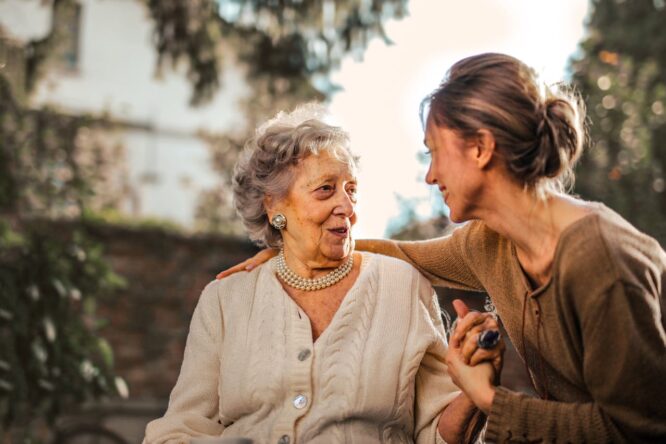There are some things women just tend to excel at—and no, it’s not cleaning the house and raising kids.

Whether it’s down to instinct, experience, or emotional intelligence, women have a way of being able to tap into incredible strength and intelligence in order to effortlessly solve certain problems or complete particular tasks without breaking a sweat. And while many men won’t admit it, the difference in ability is pretty clear. That’s not to say that men can’t also be good at these things, or that it’s a competition—women just deserve a bit more credit in life, don’t you think?
1. Reading between the lines easily

While plenty of men value direct communication, women often pick up on what’s not being said. Whether it’s a glance, a tone change, or a change in energy, they tend to notice it instinctively. It’s not always about intuition, either. In fact, it’s usually just really good observation paired with strong emotional context.
Instead of waiting for someone to spell things out, women are more likely to piece together the real story based on subtle cues. It means they often know what’s really going on in a room before anyone’s said a word. That’s a level of awareness that catches many men off guard.
2. Staying calm under emotional pressure

Despite the old stereotype of women being more emotional, they’re often the ones holding things together when emotions run high. They’re used to managing feelings, both their own and everyone else’s. That makes them better at navigating tension without letting it blow up unnecessarily.
Whether it’s a family argument or a relationship breakdown, women are frequently the ones trying to keep the peace and offer support. They’ve had more practice at sitting with difficult feelings and processing them rather than reacting right away, which often helps defuse situations more smoothly than men realise.
3. Building genuine emotional connections

Women are typically more open to deep, vulnerable conversations, and they’re good at inviting other people into that space too. They don’t shy away from talking about feelings or offering emotional support. That connection-building just comes naturally.
They also ask follow-up questions, remember emotional details, and check in meaningfully. While some men are capable of this too, many don’t prioritise it the same way. Women’s ability to forge and maintain emotional intimacy is one of their most powerful social strengths.
4. Noticing when someone’s struggling

Women are more likely to pick up on signs that something’s off. Whether it’s a change in routine, behaviour, or tone, they tend to clock these things early. It’s part instinct, part attentiveness.
They also know how to gently approach someone who’s struggling without making them feel exposed. That kind of care often goes unspoken, but it can make a huge difference, especially in friendships and family dynamics where men might not say anything until it’s urgent.
5. Multitasking without the chaos

The stereotype exists for a reason—women are often managing five things at once, and doing it well. From work deadlines to school pick-ups and emotional support, they know how to juggle multiple roles without completely losing it.
It’s not just about doing more; it’s about switching between different types of tasks and mental loads. While multitasking isn’t always ideal, women are usually the ones expected to handle it all, and many have learned how to do it with a kind of quiet efficiency men often underestimate.
6. Maintaining strong social bonds

Women often keep friendships going even when life gets busy. They’ll send a quick message to check in, remember birthdays, and make plans just to catch up. That maintenance work is usually what keeps social networks alive.
Men’s friendships can be more activity-based or infrequent, whereas women put consistent effort into nurturing connections. That’s why women often have deeper, longer-lasting friendships—they’re better at the emotional upkeep that relationships need to survive long-term.
7. Handling awkward situations with grace

Whether it’s navigating passive-aggressive comments or helping someone save face in a tense moment, women are usually better at smoothing things over. They know how to diffuse awkwardness without making it worse.
Instead of calling something out directly or ignoring it completely, they often steer the conversation in a safer direction. It’s a mix of tact, quick thinking, and emotional reading, all of which they’ve honed through years of social negotiation that many men just haven’t practised as much.
8. Expressing vulnerability without shame

While men are still encouraged to “man up” and hide their feelings, women are often more comfortable being vulnerable. They’ll admit when they’re hurt, confused, or unsure because they’ve been taught it’s okay to share those parts of themselves.
That openness doesn’t make them weak. It makes them more emotionally resilient. They’re able to process, reflect, and move forward without bottling everything up. It’s a kind of strength that often goes unnoticed, but it’s what keeps many women emotionally grounded.
9. Thinking long-term without needing constant credit

Women tend to think ahead—planning for school holidays, budgeting for the future, or noticing relationship red flags before they explode. They’re more likely to play the long game and make decisions based on what’s sustainable, not just what feels good now.
They don’t always need recognition for it, either. A lot of their decision-making happens behind the scenes. It’s the kind of quiet strategic thinking that often gets overlooked but holds everything together as time goes on.
10. Offering comfort in a way that actually helps

When someone’s upset, women usually know how to respond in a way that actually soothes rather than dismisses. They don’t jump straight to problem-solving or awkward silences—they listen, validate, and sit with you in the moment.
Comfort isn’t about fixing; it’s about being present. And women tend to understand that more instinctively. Whether it’s a gentle word or just a warm presence, they often give people exactly what they need emotionally, even if they don’t say it out loud.
11. Owning mistakes without ego

It’s not always easy to admit when you’re wrong, but women are often quicker to do it and move forward. They’re more used to examining their behaviour and apologising when needed without turning it into a power play.
That kind of humility builds stronger trust and keeps conflict from spiralling. They’re not submissive, they’re emotionally mature. Women tend to recognise that growth comes from owning your part, and they don’t let pride get in the way as often.
12. Making other people feel seen and heard

Women often have a way of making people feel like they matter. Whether it’s asking thoughtful questions, remembering small details, or creating space for other people to speak, they naturally put people at ease.
The ability to tune into people makes them great at building trust and creating inclusive environments. It’s not performative; it’s just part of how they relate to the world. That’s something many men could learn from, especially in leadership or relationship roles.
13. Dealing with change without freaking out

Life throws a lot at women. whether it’s hormonal changes, career moves, or family dynamics. They’re used to adapting, pivoting, and staying steady even when things are uncertain. That built-in flexibility helps them stay grounded when plans shift.
Instead of panicking, they reassess and adjust. It’s not always calm or easy, but they’re resilient in a way that often surprises people. They’ve learned to expect disruption and keep going anyway, which gives them a quiet kind of power in unpredictable situations.
14. Standing up for other people without making it about themselves

Women are often the first to call out unfairness—whether it’s in the workplace, in social groups, or at home. When they advocate for someone, they usually do it without centring themselves. It’s about empathy, not ego.
That protective instinct can be fierce, but it’s rarely about showboating. They step up because they see someone being mistreated and can’t just watch it happen. That kind of allyship often flies under the radar, but it makes a lasting difference.




